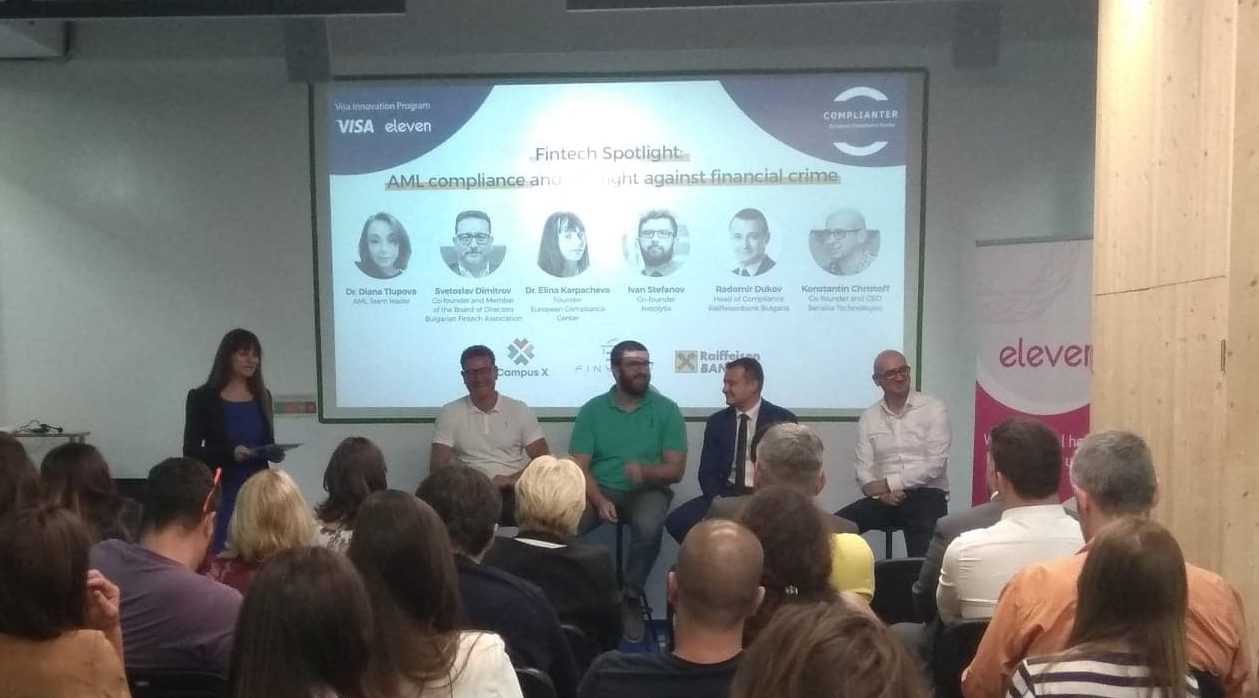by Elina Karpacheva
The Bulgarian FinTech community met to discuss compliance and financial crime for the first time in Sofia. The Spotlight event, organized by Eleven Ventures and the European Compliance Center was truly a success – an evening full of valuable insights and discussions between entrepreneurs and AML/financial crime specialists. The event showed that the thriving innovative ecosystem seriously takes into account the AML/financial crime risks and is committed to building effective internal systems for detection, prevention and response. The event coincided with the launch of the First Bulgarian FinTech report. Bulgaria is the fastest growing Fintech destination in the CEE region according to the newest CEE Fintech Atlas by the Raiffeisen Bank International (RBI).
The Fintech industry has over 40 guests, which consist of banking professionals, financial experts and compliance specialists. Together they discussed new challenges and trends in money-laundering prevention and the fight against financial crime. The speakers and attendees contemplated on a range of key topics such as the specificities of the onboarding process, sanction screening and transaction monitoring, the relationship between Fintech companies and banking institutions, the RegTech solutions for effective compliance, international best practices and the hurdles of national legal regime.
Balancing commercial and regulatory demands
The biggest challenge facing the FinTech community is balancing commercial and regulatory demands. All speakers agreed that FinTech entrepreneurs must take into account compliance risks since the very outset of their business activities. Setting the right controls and procedures during upscaling is far too late. Focusing on superior customer experience is surely a good thing, but resources and people should be devoted to AML/financial crime prevention. While such focus is difficult, companies that effectively adapt their internal systems will be the ones successful in the long term.
In such a setting, it is beneficial for the industry if banks act more like partners then as rivals. One such opportunity is The Open banking requirement. Established financial institutions have a long history of compliance expertise of what might go wrong. They can provide valuable know-how and help innovative FinTechs keep-up with the compliance standard via partnerships and common projects. The key compliance principles are the same for both parties: know your risks, know your product and know your customer. However, banks tend to engage themselves in de-risking, especially when it comes to virtual currency operators.
The future of FinTech compliance is in using technology and minimizing manual processes or human input. In this area, start-ups can avoid the mistakes of traditional financial institutions, being agile, flexible and without path-dependent systems to deal with. The RegTech industry as a provider of configurable, easy to integrate, and cost-effective regulatory solutions will continue to attract attention. There are two main areas where automatization is of utter importance:
(1) identification and verification of clients through different information sources and
(2) identifying and flagging suspicious transactions by data mining algorithms that analyze large volumes of data.
Participants also called for more cross-sectoral engagement where firms, regulators and compliance professionals communicate with each other. They called for better alignment of national AML regime within the international standards. The FinTech spotlight is the beginning of initiatives that will bring together businesses, the public sector, academics and other stakeholders interested in compliance and integrity more frequently. The European Compliance Center believes that positive social change will come only if professionals and organizations work together and share ideas and best practices.
The author, Dr. Elina Karpecheva is the Chair of the European Compliance Centre based in Sofia, Bulgaria. She is also the Content Director of the Bulgarian website of the Risk & Compliance Platform Europe, to be launched in autumn 2019.




johfert Bristomm Reageren
That is a very comprehensive article fincial is a very manageable to transaction in every compmany.
Transaction Monitoring System in Pakistan